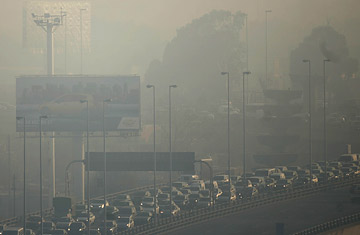
Smoke caused by burning grass envelops Buenos Aires.
Argentina's capital city of Buenos Aires awoke under an acrid cloud as an ecological disaster of major proportions covered the city. Thick smoke from out-of-control grass fires raging in the large islands of the Parana River Delta some 30 minutes north of the city rolled over urban areas, resulting in the closing of airports, ports and bus terminals. Meanwhile, the authorities were forced to block highway motor traffic following a number of fatal acciddents on smoke-choked national roads. The air has been unbreathable; asthmatics were suffering, as were infants.
The government of President Cristina Fernandez blamed farmers for the increasingly unbreathable air. It continues to be on the political offensive against the private agricultural sector following a major farm strike against export taxes earlier this month. "This is the largest fire of this kind we've ever seen," said Interior Minister Florencio Randazzo in an emergency press conference at the Casa Rosada presidential palace. "It was started by farmers clearing land for cattle grazing driven by greed for profit with total disregard for human life." The President was just as harsh. "This is not a natural disaster, this is the result of certain aspects of human nature, irrationaity and irresponsibility."
The fires, which have been raging out of control for two weeks now, have consumed some 80,000 hectares (300 square miles) of farmland on the giant river islands beyond the capital. Most local media reporting agree that the fires are caused by indiscriminate burning by cattle farmers who are opening up new land for grazing because existing farmland has been turned over to more profitable soy production. The area has a cattle population of some one million animals.
In some parts of the provinces of Buenos Aires, Santa Fe and Entre Rios visibility is near zero, as black clouds from some 300 simultaneous fires cover farmlands, population centres and the highways connecting Argentina with neighboring Paraguay and Brazil. The smoke has even crossed the border to Uruguay, where the capital city of Montevideo is now hazy with Argentine smoke.
"Not even strong rainfall would stop this now," says firefighter Jorge Albornoz in the rural area of Victoria in Entre Rios, who said some of the islands under fire, cut off by collapsed bridges and thick smoke, are unreachable by firefighters overwhelmed by the size of the fire and by the lack of equipment. Even the single airplane and two helicopters available equipped for dousing water on the flames are unable to penetrate the thick smoke over the area. Meanwhile, the government announced phone numbers for neighbors to report farmers who have started fires.
